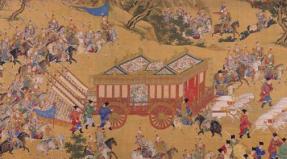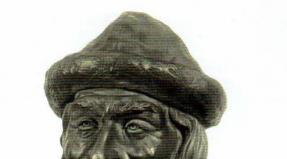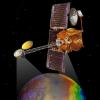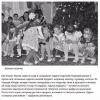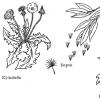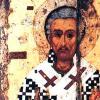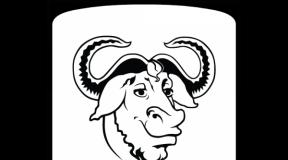Aristotle as the founder of formal logic
TEST
BY DISCIPLINE
LOGICS
"HISTORY OF THE SCIENCE OF LOGIC"
Option number 1
Completed by: Lobankova Ya. N.
Student gr. ZSP-15, 1 course
Teacher: Sidorova I. M.
Teacher's signature: __________
Date: __________
Rybinsk 20___
Plan
1. Reasons for the emergence of the science of logic ……………………………………………….. 3
2. The main stages of the development of logic …………………………………………………………… 5
3. Aristotle - the founder of formal logic ……………………………… 8
4. F. Bacon - the founder of inductive logic ……………………………… 10
5. Deductive method of R. Descartes ……………………………………………………………… 13
6. F. Hegel - the creator of the most developed system of didactic logic.…………………………………………………………………………………………………… . 15
7. Development of symbolic (mathematical) logic………………………….. 17
2nd part. Tasks and exercises ……………………………………………………… 19
References ……………………………………………………………………………… 26
Reasons for the emergence of the science of logic
The main reasons for the emergence of logic as a science are:
1) the origin and development of sciences. Logic also tried to identify and explain the requirements that scientific thinking must satisfy in order for its results to correspond to reality;
2) the development of oratory and the art of argument. Aristotle is considered to be the founder of logic as a science. However, the first systematic presentation of logical problems was earlier given by another ancient Greek philosopher - Democritus. Among his many works was an extensive treatise in three books "On the logical, or on the canons" (from the Greek canon - "rule, prescription"). In this work, the essence of the main forms of cognition and the criteria of truth were revealed, the role of logical reasoning in cognition was shown, a classification of judgments was given, and an attempt was made to develop inductive logic.
At the center of Aristotle's logical thinking lies the theory of deductive reasoning and proof. He also gave a classification of categories and a classification of judgments close to Democritus, formulated three fundamental laws of thinking - the law of identity, the law of contradiction and the law of the excluded middle.
In the Middle Ages, the problem of general concepts - "universals" - played in the development of logic as a science. The essence of the problem lies in what appears earlier - general concepts arising from our mind (rationalism), or single, factual objects (nominalism).
During the Renaissance, logic experienced a real crisis. It was regarded as artificial thinking and was opposed to natural thinking based on intuition and imagination.
The next stage in the development of logic begins in the 17th century. It is associated with the creation within its framework of inductive logic, which reflects the diverse processes of obtaining general knowledge based on the accumulated empirical material. The need for such knowledge was most fully realized and expressed in his writings by F. Bacon. He became the founder of intuitive logic.
The growing needs of scientific and technological progress determine the further development of modern logic.
The main stages in the development of logic
The identification of logic as a special branch of knowledge was facilitated by two circumstances:
1) even in ancient times, people knew that the reliability of inference knowledge depends not only on the truth
2) in order to convince, one must not only speak well, but also master various methods of constructing inferences and evidence.
Therefore, logic was used theoretically and practically in everyday intellectual and speech activity and entered the program of European universities as part of the so-called trivium - the first stage of higher education, which, in addition to logic, included grammar and rhetoric.
We list the main representatives of logic as a science (note that the name of each of them marks an independent stage in the development of logic):
Aristotle (deductive logic, "Organon", 4th century BC, basic laws of correct thinking);
F. Bacon (1561 - 1626) ("New Organon" - the manifesto of inductive logic, the time of experiments);
Hegel (1770-1831) (dialectical logic, knowledge of the world from the point of view of dynamics, fluidity, later its application was expanded);
J. Boole (1815-1864) - (mathematical logic, logic by subject and mathematics by method, discussion of problems about the possible formalization of thinking and its practical application).
The last stage in the development of logic is non-classical logic.
As an independent science, logic developed more than two thousand years ago, in IV Fr. BC. Its founder is the ancient Greek philosopher Aristotle (348-322 BC). The Aristotelian doctrine of syllogism formed the basis of one of the areas of modern mathematical logic - the logic of predicates.
An important stage in the development of the teachings of Aristotle was the logic of the ancient Stoics. The logic of the Stoics is the basis of another direction of mathematical logic - the logic of propositions.
The 4th figure of the categorical syllogism is named after Galen.
Boethius's writings served as the main logical aids for a long time.
Logic also developed in the Middle Ages, but scholasticism distorted the teachings of Aristotle, adapting it to justify religious dogma.
The most important stage in its development was the theory of induction developed by the English philosopher F. Bacon (1561-1626). Bacon criticized the deductive logic of Aristotle, distorted by medieval scholasticism. The development of the inductive method is a great merit of Bacon, but he unjustly opposed it to the method of deduction; In fact, these methods do not exclude, but complement each other. Bacon developed methods of scientific induction, which were later systematized by the English philosopher and logician J.St. Millem (1806-1873)
This logic is usually called formal, since it arose and developed as a science of forms of thinking. It is also called traditional or Aristotelian logic.
The further development of logic is associated with the names of such prominent Western European thinkers as R. Descartes, G. Leibniz, I. Kant and others.
The French philosopher R. Descartes (1569-1650) criticized medieval scholasticism, developed the ideas of deductive logic, formulated the rules for scientific research, set forth in the essay "Rules for the Guidance of the Mind"
G. Leibniz (1646 - 1716), formulated the law of sufficient reason, - put forward the idea of mathematical logic, which was developed only in the XIX-XX centuries; the German philosopher I. Kant (1724-1804) and many other Western European philosophers and scientists.
A number of original ideas were put forward by M. V. Lomonosov (1711-1765), A. N. Radishchev (1749-1802), N. G. Chernyshevsky (1828-1889). The Russian logicians M.I. Kariyskiy (1804-1917) and L.V. Rutkovsky (1859-1920) are known for their innovative ideas in the theory of inference. One of the first to develop the logic of relations was the philosopher and logician S. I. Povarnin (1807-1952).
In the second half of the 19th century, calculus methods developed in mathematics began to be widely used in logic. This direction is being developed in the works of D. Boole, W.S. Jevons, P.S. Poretsky, G. Frege, C. Pierce. The theoretical analysis of deductive reasoning by methods of calculus using formalized languages is called mathematical or symbolic logic.
3. Who is the founder of the science of logic?
- Aristotle
Logic is one of the oldest sciences. It is currently not possible to establish exactly who, when and where first turned to those aspects of thinking that are the subject of logic. Separate sources of the logical doctrine can be found in India, at the end of the 2nd millennium BC. e. However, if we talk about the emergence of logic as a science, that is, about a more or less systematized body of knowledge, then it would be fair to consider the great civilization of Ancient Greece as the birthplace of logic. It was here in the V-IV centuries BC. e. during the period of rapid development of democracy and the unprecedented revival of social and political life associated with it, the foundations of this science were laid by the works of Democritus, Socrates and Plato.
The ancestral head, the father of logic, is rightfully considered the greatest thinker of antiquity, a student of Plato - Aristotle (384--322 BC). It was he who, in his works, united by the common name Organon (instrument of knowledge), for the first time thoroughly analyzed and described the basic logical forms and rules of reasoning, namely: the forms of conclusions from the so-called categorical judgments - categorical syllogism (First Analytics), formulated the main principles of scientific evidence (Second Analytics), gave an analysis of the meaning of certain types of statements (On Interpretation), outlined the main approaches to developing a doctrine of the concept (Category). Aristotle also paid serious attention to exposing various kinds of logical errors and sophistical methods in disputes (On Sophistic Refutations).
The founder of logic - or, as they sometimes say, the father of logic - is considered to be the largest ancient Greek philosopher and scientist-encyclopedist Aristotle (384--322 BC. However, it should be borne in mind that the first is quite detailed and systematic The logical presentation of logical problems was actually given by the earlier ancient Greek philosopher and naturalist Democritus (460 - approximately 370 BC)... Among his many works was an extensive treatise in three books On the logical, or On the canons (from the Greek kanon - prescription, rule) Ivlev Y. Logic for lawyers. - M .: BEK, 2001. - P. 22. Here, not only the essence of knowledge, its main forms and criteria of truth were revealed, but also the enormous role of logical reasoning in cognition is shown, a classification of judgments is given, some types of inferential knowledge are subjected to resolute criticism, and an attempt is made to develop inductive logic - the logic of experimental knowledge.
Unfortunately, this treatise of Democritus, like all the others, has not come down to us. However, it was widely used by Aristotle in his development of a grandiose system of logic. And from it directly originates modern logic.
Aristotle owns a number of treatises on logic, later united under the name Organon from the Greek. organon - tool, tool).
In the focus of all his logical reflections is the theory of inferential knowledge - deductive reasoning and proof. It was developed with such depth and thoroughness that it went through the thickness of centuries and basically retained its significance to this day. Aristotle also gave a classification of categories - the most general concepts and a classification of judgments close to Democritus's, formulated three fundamental the law of thought is the law of identity, the law of contradiction, and the law of the excluded third. The logical teaching of Aristotle is remarkable in that, in the embryo, it contains, in essence, all the later sections, directions and types of logic - inductive, symbolic, dialectical. True, Aristotle himself called the science he created not logic, but primarily analytics, although he used the term logical. The term logic itself entered scientific circulation a little later, in the 3rd century BC. BC e. Moreover, in accordance with the dual meaning of the ancient Greek word logos (both word and thought), he combined both the art of thinking - dialectics, and the art of reasoning - rhetoric. - The founder of logic as a science is the ancient Greek philosopher and scientist Aristotle (384-322 BC). He first developed the theory of deduction, that is, the theory of logical inference. It was he who drew attention to the fact that in reasoning we deduce others from some statements, proceeding not from the specific content of the statements, but from a certain relationship between their forms and structures.
Even then, in ancient Greece, schools were created in which people learned to discuss. The students of these schools learned the art of searching for the truth and convincing other people that they were right. They learned to select the necessary facts from a multitude of facts, to build chains of reasoning that connect individual facts with each other, and to draw the right conclusions.
The ancient Greek mathematician Euclid (330-275 BC) made the first attempt to streamline the vast information on geometry that had accumulated by that time. He laid the foundation for understanding geometry as an axiomatic theory, and all mathematics as a set of axiomatic theories.
For many centuries, various philosophers and entire philosophical schools supplemented, improved and changed the logic of Aristotle. This was the first, pre-mathematical, stage in the development of formal logic. The second stage is associated with the use of mathematical methods in logic, which was initiated by the German philosopher and mathematician G. W. Leibniz (1646-1716). He tried to build a universal language that would resolve disputes between people, and then completely replace all ideas with calculations.
An important period in the development of mathematical logic begins with the work of the English mathematician and logician George Boole (1815-1864) Mathematical Analysis of Logic (1847) and Studies in the Laws of Thought (1854). He applied to logic the methods of contemporary algebra - the language of symbols and formulas, the formulation and solution of equations. He created a kind of algebra - the algebra of logic. During this period, it took shape as an algebra of propositions and was significantly developed in the works of the Scottish logician A. de Morgan (1806-1871), English - W. Jevons (1835-1882), American - C. Pierce and others. The creation of the algebra of logic was the final link in the development of formal logic.
A significant impetus to a new period in the development of mathematical logic was given by the creation of non-Euclidean geometry in the first half of the 19th century by the great Russian mathematician N.I. Lobachevsky (1792-1856) and, independently of him, by the Hungarian mathematician Ya. In addition, the creation of the analysis of infinitesimals led to the need to justify the concept of number as a fundamental concept of all mathematics. The picture was completed by the paradoxes discovered at the end of the 19th century in set theory: they clearly showed that the difficulties of substantiating mathematics are difficulties of a logical and methodological nature. Thus, mathematical logic faced problems that did not arise before the logic of Aristotle. In the development of mathematical logic, three directions of substantiation of mathematics were formed, in which the creators tried in different ways to overcome the difficulties that arose.
SAINT PETERSBURG STATE TECHNOLOGICAL INSTITUTE (TECHNICAL UNIVERSITY)
Department of Philosophy
SUMMARY ON THE TOPIC:
“ARISTOTLE - the founder of the science of Logic”
Completed:
Group 226 student
Rodin D.I.
Supervisor:
Kutykova I.V.
Saint Petersburg
Introduction…………………………………………………………………………………..3
Brief biography of Aristotle…………………………………………………………………………………. ...........4
What is logic?..…………….…………………………………………………………….6
The logic of Aristotle………………………………………………………………………….6
Logical products of Aristotle…………………………………………………….9
Conclusion……………………………………………………………………………… 13
References……………………………………………………………………...14
INTRODUCTION
In ordinary everyday life, our thinking, our mind is subject to certain everyday rules, all our actions are a reaction to something or someone, and the reaction itself is determined by a logical conclusion from the current situation. Logical thinking is inherent in any living being. The very first human desires: the desire for food, water and shelter are due to primitive logic: the need to live and survive in any conditions. After all, instinct is also a kind of logic. Logic served as one of the impetuses for the development of mankind. But the interesting thing is that if we consider the concept of logic from a philistine point of view, then any human act can be included in its framework, no matter how strange it may seem to us, because the logic of one person is at least somewhat different from the logic of another. Therefore, we often do not understand the actions of other people, they seem illogical to us. A person who has committed a strange act from our point of view may try to convince us, he will begin to give us arguments that his logic tells him, but we most likely will not understand him anyway. It is as if we were trying to explain the taste of fish to a person who has never tasted it.
A whole separate science is devoted to the study of logical thinking. Modern logic includes two relatively independent sciences: formal logic and dialectical logic. Exploring thinking from different angles, dialectical logic and formal logic develop in close interaction, which is clearly manifested in the practice of scientific and theoretical thinking, which uses both the logical apparatus and the means developed by dialectical logic in the process of cognition.
Logic as a science originated in ancient Greece. The earliest mention of logical problems can be found in the writings of Parmenides of Elea, who was born around 540. BC. and Heraclitus of Ephesus, who lived approximately between 530 and 470 BC. BC. One can talk about logic in the sense of science only from the time of Aristotle (4th century BC). The logic founded by Aristotle is usually called formal. This name was assigned to it because it arose and developed as a science of the forms of thinking.
BRIEF BIOGRAPHY OF ARISTOTLE
Aristotle was born in 384 BC. e. in the city of Stagira on the northwestern coast of the Aegean Sea. Aristotle's father was Nicomachus, the court physician of Amyntas III, king of Macedonia. Aristotle lost his parents early. He was brought up in Atarney by Proxenus, his relative. At the age of eighteen he went to Athens and entered Plato's Academy, where he remained until Plato's death around 347 BC. During his time at the Academy, Aristotle studied the philosophy of Plato, as well as its Socratic and pre-Socratic sources, and many other disciplines. Apparently, Aristotle taught rhetoric and other subjects at the Academy. It is possible that it was during this period of his work that works on logic were created.
Around 348–347 BC Plato's successor at the Academy was Speusippus, with whom Aristotle had a tense relationship, so he had to leave the Academy, although after that Aristotle continued to consider himself a Platonist. Since 355, he lives first in Assos, in Asia Minor, under the auspices of the tyrant of the city of Atarney Germia. The latter provided him with excellent working conditions. Aristotle married here a certain Pythiades - either a daughter, or an adopted daughter, or a niece of Hermius, but according to some sources, his concubine. Three years later, the philosopher leaves for Mytilene on the island of Lesbos. This happened shortly before or immediately after the death of Hermias, who was treacherously captured by the Persians and crucified.
Hermias was an ally of the Macedonian king Philip II, father of Alexander, so, perhaps, it was thanks to Hermias that Aristotle in 343 or 342 BC. received an invitation to take the post of mentor to the young heir to the throne, who was then 13 years old. Aristotle accepted the offer and moved to Pella, the Macedonian capital. Little is known about the personal relationship of the two great people. Judging by the reports that we have, Aristotle understood the need for a political unification of small Greek policies, but he did not like Alexander's desire for world domination. When in 336 BC. Alexander ascended the throne, Aristotle returned to his homeland, to Stagira, and a year later returned to Athens.
During this time, the nature of Aristotle's thinking, his ideas have undergone some changes. Often his ideas came into direct conflict with the views of Plato's successors in the Academy and some of the teachings of Plato himself. This critical approach was expressed in the dialogue "On Philosophy", as well as in the early sections of the works that have come down to us under the conditional names "Metaphysics", "Ethics" and "Politics". Feeling his ideological disagreement with the teachings prevailing in the Academy, Aristotle chose to found a new school, the Lyceum, in the northeastern suburbs of Athens. The goal of the Lyceum, like the goal of the Academy, was not only teaching, but also independent research. Here Aristotle gathered around him a group of gifted students and assistants.
Aristotle and his students made many significant observations and discoveries that left a noticeable mark on the history of many sciences and served as the foundation for further research. In this they were helped by samples and data collected on Alexander's long campaigns. However, the head of the school paid more and more attention to fundamental philosophical problems. Most of the philosophical works of Aristotle that have come down to us were written during this period.
In 323 BC Alexander died suddenly, and a wave of anti-Macedonian speeches swept through Athens and other cities of Greece. Aristotle's position was threatened by his friendship with Philip and Alexander, as well as by his unequivocal political convictions, which came into conflict with the patriotic enthusiasm of the city-states. Under the threat of persecution, Aristotle left the city in order, as he said, to prevent the Athenians from committing a crime against philosophy a second time (the first was the execution of Socrates). He moved to Chalkis on the island of Euboea, where the estate inherited from his mother was located, where, after a short illness, he died in 322 BC.
An interesting fact: there is an opinion that Aristotle, who had very difficult relations not only with the Macedonian rulers, but also with Athenian patriots, not only poisoned Alexander the Great, but also poisoned himself with aconite, as Diogenes Laertius reports.
WHAT IS LOGIC?
LOGIC (Greek logike), the science of methods of proof and refutation; a set of scientific theories, each of which considers certain methods of evidence and refutation. Distinguish between inductive and deductive logic, and in the latter - classical, intuitionistic, constructive, modal, etc. All these theories are united by the desire to catalog such methods of reasoning that lead from true judgments-premisses to true judgments-consequences; cataloging is carried out, as a rule, within the framework of logical calculations. Applications of logic in computational mathematics, automata theory, linguistics, computer science, etc. play a special role in accelerating scientific and technological progress.
ARISTOTEL'S LOGIC
Oddly enough, the name of the science of logic was given not by Aristotle, but by Alexander of Aphrodisias 500 years later, commenting on the works of the philosopher, although logic almost reached perfection during the life of Stagirite. Up until the thirteenth century, Aristotle's influence in the field of metaphysics was lost, but his authority in logic remained. It is interesting that even today many teachers of logic as a science often reject the discoveries of modern logic and adhere with strange constancy to a system that is about as outdated as Ptolemaic astronomy. Although one cannot deny the fact that the foundations of logic have remained unchanged for a long time, and they were created by Aristotle.
What is logic to Aristotle?
Aristotle perceives logic not as an independent philosophical doctrine, but rather as a necessary tool for all sciences and philosophy in particular. The later notion of logic as a "tool", although Aristotle himself did not call it that, perhaps corresponds to his own ideas. It is clear that logic must precede philosophy. Aristotle divides philosophy itself into two parts - theoretical, which strives to achieve truth, independent of anyone's desire, and practical, occupied by the mind and human aspirations, which, by joint efforts, try to understand the essence of human good and achieve it. In turn, theoretical philosophy is divided into three parts: the study of a changing being (physics and natural science, including the science of man); study of the existence of abstract mathematical objects (various branches of mathematics); the study of being as such (what we call metaphysics).
Logic is one of the most ancient subjects, standing next to philosophy and sociology and being an essential general cultural phenomenon from the very beginning of its occurrence. The role of this science in the modern world is important and multifaceted. Those who have knowledge in this area can conquer the whole world. It was believed that this is the only science capable of finding compromise solutions in any situation. Many scientists attribute the discipline to others, while, in turn, refute this possibility.
Naturally, the orientation of logical research changes over time, methods improve and new trends arise that meet scientific and technical requirements. This is necessary because every year society faces new problems that cannot be solved by outdated methods. The subject of logic studies the thinking of a person from the side of those patterns that he uses in the process of knowing the truth. In fact, since the discipline we are considering is very multifaceted, it is studied using several methods. Let's take a look at them.
Etymology of logic
Etymology is a section of linguistics, the main purpose of which is the origin of the word, its study from the point of view of semantics (meaning). "Logos" in Greek means "word", "thought", "knowledge". Thus, we can say that logic is a subject that studies thinking (reasoning). However, psychology, philosophy and physiology of nervous activity, one way or another, also study thinking, but can it be said that these sciences study the same thing? Quite the contrary - in a sense they are opposites. The difference between these sciences lies in the way of thinking. Ancient philosophers believed that human thinking is diverse, because he is able to analyze situations and create an algorithm for performing certain tasks to achieve a specific goal. For example, philosophy as a subject is rather just reasoning about life, about the meaning of being, while logic, in addition to idle thoughts, leads to a certain result.
Reference Method
Let's try to use dictionaries. Here the meaning of this term is somewhat different. From the point of view of the authors of encyclopedias, logic is a subject that studies the laws and forms of human thinking from the surrounding reality. This science is interested in how “living” true knowledge functions, and in search of answers to their questions, scientists do not turn to each specific case, but are guided by special rules and laws of thought. The main task of logic as a science of thinking is to take into account only the method of obtaining new knowledge in the process of cognition of the surrounding world, without linking its form with specific content.
Logic principle
The subject and meaning of logic is best seen through a concrete example. Let's take two statements from different fields of science.
- “All stars have their own radiation. The sun is a star. It has its own radiation."
- Any witness must tell the truth. My friend is a witness. My friend is obliged to tell the truth.
If you analyze it, you can see that in each of them the third is explained by two arguments. Although each of the examples belongs to different areas of knowledge, the way the content components are connected in each of them is the same. Namely: if an object has a certain property, then everything that concerns this quality has another property. Result: The item in question also has this second property. These cause-and-effect relationships are called logic. This relationship can be observed in many life situations.
Let's turn to history
To understand the true meaning of this science, you need to know how and under what circumstances it arose. It turns out that the subject of logic as a science arose in several countries almost simultaneously: in ancient India, in ancient China and in ancient Greece. If we talk about Greece, then this science arose during the period of the decomposition of the tribal system and the formation of such sections of the population as merchants, landowners and artisans. Those who ruled Greece infringed on the interests of almost all segments of the population, and the Greeks began to actively express their positions. In order to resolve the conflict peacefully, each of the parties used their own arguments and arguments. This gave impetus to the development of such a science as logic. The subject was used very actively, because it was very important to win discussions in order to influence decision-making.
In ancient China, logic arose during the golden age of Chinese philosophy, or, as it was also called, the period of “fighting states”. Similar to the situation in ancient Greece, the struggle between the wealthy sections of the population and the authorities also flared up here. The first wanted to change the structure of the state and cancel the transfer of power in a hereditary way. During such a struggle, in order to win, it was necessary to gather around him as many supporters as possible. However, if in ancient Greece this served as an additional incentive for the development of logic, then in ancient China it was quite the opposite. After the kingdom of Qin nevertheless became dominant, and the so-called cultural revolution took place, the development of logic at this stage

it stopped.

Given that in different countries this science arose precisely during the period of struggle, the subject and meaning of logic can be characterized as follows: it is the science of the sequence of human thinking, which can positively influence the resolution of conflict situations and disputes.
The main subject of logic
It is difficult to single out one specific meaning that could generally characterize such an ancient science. For example, the subject of logic is the study of the laws of derivation of correct definite judgments and statements from certain true circumstances. This is how Friedrich Ludwig Gottlob Frege characterized this ancient science. The concept and subject of logic was also studied by Andrey Nikolayevich Shuman, a well-known logician of our time. He considered it to be the science of thinking, which explores different ways of thinking and models them. In addition, the object and subject of logic is, of course, speech, because logic is carried out only with the help of conversation or discussion, and it does not matter at all whether it is aloud or “to oneself”.

The above statements indicate that the subject of the science of logic is the structure of thinking and its various properties that separate the sphere of abstract-logical, rational thinking - forms of thinking, laws, necessary relationships between structural elements and the correctness of thinking to achieve the truth.
The process of searching for truth
In simple terms, logic is a thought process of searching for truth, because on the basis of its principles the process of searching for scientific knowledge is formed. There are various forms and methods of using logic, and all of them are combined into the theory of knowledge derivation in various fields of science. This is the so-called traditional logic, within which there are more than 10 different methods, but Descartes' deductive logic and Bacon's inductive logic are still considered the main ones.
deductive logic
We all know the method of deduction. Its use is somehow connected with such a science as logic. The subject of Descartes' logic is a method of scientific knowledge, the essence of which lies in the strict derivation of new ones from certain provisions that have been previously studied and proven. He was able to explain why, since the original statements are true, then the derived ones are also true.

For deductive logic, it is very important that there are no contradictions in the initial statements, since in the future they can lead to incorrect conclusions. Deductive logic is very precise and does not tolerate assumptions. All postulates that are used, as a rule, are based on verified data. This one has the power of persuasion and is used, as a rule, in the exact sciences, such as mathematics. Moreover, the very method of finding the truth is not questioned, but studied. For example, the well-known Pythagorean theorem. Is it possible to doubt its correctness? Rather, on the contrary - it is necessary to learn the theorem and learn how to prove it. The subject "Logic" studies exactly this direction. With its help, with the knowledge of certain laws and properties of the subject, it becomes possible to derive new ones.
inductive logic
It can be said that Bacon's so-called inductive logic practically contradicts the basic principles of deductive logic. If the previous method is used for the exact sciences, then this one is for the natural sciences, in which logic is needed. The subject of logic in such sciences: knowledge is obtained through observations and experiments. There is no place for exact data and calculations. All calculations are made only purely theoretically, with the aim of studying an object or phenomenon. The essence of inductive logic is as follows:
- To carry out constant monitoring of the object that is being investigated, and to create an artificial situation that could theoretically arise. This is necessary to study the properties of certain subjects that cannot be learned in natural conditions. This is a prerequisite for studying inductive logic.
- Based on observations, collect as many facts as possible about the object under study. It is very important to note that since the conditions were created artificially, the facts may be distorted, but this does not mean that they are false.
- Summarize and systematize the data obtained during the experiments. This is necessary to assess the situation. If the data is not enough, then the phenomenon or object must be placed again in another artificial situation.
- Create a theory to explain the data obtained and predict their further development. This is the final stage, which serves to sum up. The theory can be drawn up without taking into account the actual data obtained, however, it will nevertheless be accurate.
For example, on the basis of empirical research on natural phenomena, the vibrations of sound, light, waves, etc., physicists formulated the position that any phenomenon that has a periodic nature can be measured. Of course, separate conditions were created for each phenomenon and certain calculations were carried out. Depending on the complexity of the artificial situation, the readings differed significantly. This is what made it possible to prove that the periodicity of oscillations can be measured. Bacon explained scientific induction as a method of scientific knowledge of cause-and-effect relationships and a method of scientific discovery.
Causal relationship
From the very beginning of the development of the science of logic, much attention was paid to this factor, which affects the entire process of research. Causality is a very important aspect in the process of studying logic. The reason is a certain event or object (1), which naturally affects the occurrence of another object or phenomenon (2). The subject of the science of logic, speaking formally, is to find out the reasons for this sequence. For from the above it follows that (1) is the cause of (2).

An example can be given: scientists who are exploring outer space and the objects that are there have discovered the phenomenon of a “black hole”. This is a kind of cosmic body, the gravitational field of which is so large that it is able to absorb any other object in space. Now let's find out the causal relationship of this phenomenon: if any cosmic body is very large: (1), then it is able to absorb any other (2).
Basic methods of logic
The subject of logic briefly studies many areas of life, however, in most cases, the information obtained depends on the logical method. For example, analysis is the figurative division of the object under study into certain parts, in order to study its properties. Analysis, as a rule, is necessarily connected with synthesis. If the first method separates the phenomenon, then the second, on the contrary, connects the received parts to establish the relationship between them.
Another interesting subject of logic is the method of abstraction. This is the process of mental separation of certain properties of an object or phenomenon in order to study them. All these techniques can be classified as methods of cognition.
There is also a method of interpretation, which consists in the knowledge of the sign system of certain objects. Thus, objects and phenomena can be given a symbolic meaning, which will facilitate understanding of the essence of the object itself.
Modern logic
Modern logic is not a doctrine, but a reflection of the world. As a rule, this science has two periods of formation. The first begins in the Ancient World (Ancient Greece, Ancient India, Ancient China) and ends in the 19th century. The second period begins in the second half of the 19th century and continues to this day. Philosophers and scientists of our time do not stop studying this ancient science. It would seem that all its methods and principles have long been studied by Aristotle and his followers, but every year logic as a science, the subject of logic, as well as its features continue to be explored.

One of the features of modern logic is the spread of the subject of research, which is due to new types and ways of thinking. This led to the emergence of such new types of modal logic as the logic of change and causal logic. It has been proven that such models are significantly different from those already studied.
Modern logic as a science is used in many areas of life, such as engineering and information technology. For example, if you consider how a computer is arranged and works, you can find out that all programs on it are executed using an algorithm, where logic is involved in one way or another. In other words, we can say that the scientific process has reached the level of development where devices and mechanisms operating on logical principles are successfully created and put into operation.
Another example of the use of logic in modern science is control programs in CNC machines and installations. Here, too, it would seem that an iron robot performs logically constructed actions. However, such examples only formally show us the development of modern logic, because only a living being, such as a person, can have such a way of thinking. Moreover, many scientists are still arguing whether animals can have logical skills. All research in this area boils down to the fact that the principle of action of animals is based only on their instincts. Only a person can receive information, process it and give the result.
Research in the field of such a science as logic can still continue for thousands of years, because the human brain has not been thoroughly studied. Every year people are born more and more developed, which indicates the ongoing evolution of man.
The purpose of logic: to ensure the attainment of truth. Formal logic is the science of the laws and forms of correct thinking aimed at obtaining the truth. Formal logic studies the forms of thinking - concepts, judgments, inferences from the side of their logical structure, distracting from their content. Aristotle is the founder of formal logic. The teachings of Aristotle (384-322), a philosopher and encyclopedic scientist, are a special form of objective idealism. He was the first of the ancient thinkers to distinguish philosophical knowledge from specific sciences and divided philosophy into the science of being (or of the first principles and causes) and philosophy, the subject of which was nature. The problems of being were at the center of the first philosophy. Aristotle developed the doctrine of the four principles of everything that exists. These first principles were: 1) matter, or the passive possibility of becoming; 2) the form by which the potential is realized, the active principle; 3) the source of movement or the creative principle, the prime mover; 4) the goal, the target reason for any activity.
For Aristotle, knowledge has being as its object. The basis of experience is sensation, memory and habit. Any knowledge begins with sensations: it is that which is able to take the form of sensually perceived objects without their matter; reason sees the general in the particular.
However, it is impossible to acquire scientific knowledge with the help of sensations and perceptions alone, because all things have a changeable and transitory character. The forms of truly scientific knowledge are concepts that comprehend the essence of a thing.
Having analyzed the theory of knowledge in detail and deeply, Aristotle created a work on logic, which retains its enduring significance to this day. Here he developed a theory of thinking and its forms, concepts, judgments and conclusions. Aristotle's logic is called "traditional" formal logic. Traditional formal logic included and includes such sections as the concept, judgment, laws (principles) of correct thinking, inferences (deductive, inductive, by analogy), the logical foundations of the theory of argumentation, hypothesis.
The task of the concept is to ascend from simple sensory perception to the heights of abstraction. Scientific knowledge is the most reliable, logically provable and necessary knowledge.
Aristotle's logic is "thinking about thinking" (
In short, Aristotelian logic studies:
1) the main types of being that fall under separate concepts and definitions;
2) the combination and separation of these types of being, which are expressed in a judgment;
3) the ways in which the mind, by means of reasoning, can pass from the truth known to the truth unknown.
In the doctrine of knowledge and its types, Aristotle distinguished between "dialectical" and "apodictic" knowledge. The area of the first is “opinion” obtained from experience, the second is reliable knowledge. Although an opinion can receive a very high degree of probability in its content, experience is not, according to Aristotle, the final instance of the reliability of knowledge, because the highest principles of knowledge are contemplated by the mind directly.
The starting point of knowledge is the sensations obtained as a result of the influence of the external world on the sense organs; without sensations there is no knowledge. Defending this epistemological basic position, "Aristotle comes close to materialism." Aristotle correctly considered sensations to be reliable, reliable evidence of things, but adding a reservation that sensations themselves determine only the first and lowest level of knowledge, and a person rises to the highest level thanks to generalization in thinking of social practice.
Aristotle saw the goal of science in a complete definition of the subject, achieved only by combining deduction and induction:
1) knowledge about each individual property must be acquired from experience;
2) the conviction that this property is essential must be proved by an inference of a special logical form - a categorical syllogism.
The basic principle of the syllogism expresses the connection between the genus, species and single thing. These three terms were understood by Aristotle as a reflection of the connection between the effect, the cause and the bearer of the cause.
The system of scientific knowledge cannot be reduced to a single system of concepts, because there is no such concept that could be the predicate of all other concepts: therefore, for Aristotle, it turned out to be necessary to indicate all the higher genera, namely the categories to which the rest of the genera of beings are reduced.
Reflecting on the categories and operating on them in the analysis of philosophical problems, Aristotle considered both the operations of the mind and its logic, including the logic of propositions. Aristotle developed and problems dialogue deepening the ideas of Socrates.
He formulated the laws of logic:
The law of identity - the concept must be used in the same meaning in the course of reasoning; that is, there should be no uncertainty.
The law of contradiction - "do not contradict yourself"; the two statements must not contradict each other.
The law of the excluded middle - "A or not-A is true, there is no third"; a proposition is either true or false, there is no middle ground.
For Aristotle, truth is the correspondence of thought to reality. He considered a judgment to be true, in which concepts are interconnected in the same way as things are interconnected in nature. And false - a judgment that connects what is disconnected in nature, or separates what is connected in it. Aristotle, relying on this concept of truth, created his own logic. In the Analysts, Aristotle develops modal logic quite thoroughly and gives a description of syllogisms from hypotheses.
Aristotle outlined his logic in the Organon. With the help of formal logic, a sentence can be correctly constructed, but the content may be incorrect. Therefore, the essence of being according to Aristotle helps to reveal the doctrine of the causes of being.
Aristotle developed the doctrine of syllogisms, which deals with all kinds of inferences in the process of reasoning.
8 .Philosophy of religion. Religion as a form of spiritual activity.
The word "religion" is translated from Latin as piety, a shrine, an object of worship. From this it follows that here we are dealing with a phenomenon that refers to something higher, holy, superhuman in human life. This highest, absolute, is the general name of God or Deity, although each individual religion has its own names for this higher power. We can say that there is no religion without God, that is, any idea of God, God is the beginning and meaning of any religion.
Note that religion, like philosophy, is a worldview, however, specific and at the same time includes certain behavior and actions that are based on the belief in the existence of several (polytheism) or one (monotheism) gods, that is, such a principle that is " sacred, supernatural, incomprehensible to the human mind. “... Any religion,” noted F. Engels, “is nothing more than a fantastic reflection in the minds of people of those external forces that dominate them in their daily life, a reflection in which earthly forces take the form of unearthly ones.”
Religious thinking, in essence, became the first form of human understanding of the world and, according to the latest scientific data, it may have arisen about 40 - 50 thousand years ago. The appearance of religion was due to such a level and quality of human thinking, when the human intellect was able to separate its thought (in the form of an image, a fetish, a word) from the reality surrounding it. In the future, as he developed, a person could construct his own ideas about his environment, relying not on objects, things, phenomena, but using products of mental activity, that is, images, fetishes, words.
In addition, religion is not only an idea of God, not only consciousness, it is real life, people's actions - a cult, worship, church organization, and finally, these are the forms and principles of organizing social life, to some extent based on religious grounds. That is, religion is an appropriate worldview and a certain sphere of human life.
God is transcendent, i.e. otherworldly, one that does not enter the limits of this vicious circle of consciousness (immanent). Therefore, a person cannot discover God, “see him”, know him in the same way as he can know any natural phenomenon. Only God himself can reveal himself to man, can cross this line between the transcendent and the immanent.
Theology and science have been looking for evidence both for and against the existence of God for centuries. But the conclusion of these searches is that this evidence is useless. They do not prove anything to a person who does not believe, and they are not needed by a person who believes. Even I. Kant believed that the existence of God can neither be logically proved nor refuted.
In addition, the following functions of religion should be identified:
Worldview - religion, according to believers, fills their lives with some special meaning and meaning.
Compensatory, or consoling, psychotherapeutic, is also associated with its ideological function and ritual part: its essence lies in the ability of religion to compensate, compensate a person for his dependence on natural and social disasters, remove feelings of his own impotence, heavy experiences of personal failures, insults and the severity of life, fear of death.
Communicative - communication between believers, "communication" with gods, angels (spirits), souls of the dead, saints, who act as ideal mediators in everyday life and in communication between people. Communication is carried out, including in ritual activities.
Regulatory - the individual's awareness of the content of certain value attitudes and moral norms that are developed in every religious tradition and act as a kind of program for people's behavior.
Integrative - allows people to realize themselves as a single religious community, held together by common values and goals, gives a person the opportunity to self-determine in a social system in which there are the same views, values and beliefs.
Political - leaders of various communities and states use religion to explain their actions, unite or divide people according to religious affiliation for political purposes.
Cultural - religion affects the spread of the culture of the carrier group (writing, iconography, music, etiquette, morality, philosophy, etc.)
Disintegrating - religion can be used to separate people, to incite enmity and even wars between different religions and denominations, as well as within the religious group itself. The disintegrating property of religion is often spread by followers who interpret the precepts of their religion in a peculiar way.
The philosophical and scientific definition of religion took shape in the process of the formation and deployment of the rationalistic tradition in philosophy and the formation of a scientific worldview. Science understands religion, first of all, as a complex spiritual formation, a specific way of human spiritual activity, a form of social consciousness. The concept of "religion" means a special view of the world, society and man, arising from the recognition of the real existence of the transcendent, supernatural, which determines the existence of the world and man, based on faith and expressed in dogma, cult, belonging to a religious group or other organizational structure.
Philosophy determines the complexity of the religious phenomenon, considering religion through categories, phenomena and entities. As a phenomenon, religion is represented by a multi-element structurally organized phenomenon. The basis of religion, without which it is impossible, is religious experience. The scientific characterization of religious experience implies, first of all, the establishment of its constitutive properties, i.e., the properties that make it religious and distinguish it from other types of human experience. A feature of religious experience is its receptive and passive character. Religious experience is not perceived by its subject as its own creation, its source and content, according to the believer, are "outside". Religious experience is something that "captures", "finds" a person, which cannot be identified with a conscious volitional or cognitive effort. For the subjects of experience, their experience means that God manifests his being, presence and will in a sovereign way.
Ethical doctrine of I. Kant.
Ethics is one of the oldest philosophical disciplines, the object of study of which is morality, morality. From the three hundred years BC. e., when ethics was first designated as a special field of study, to this day, interest in understanding it has not weakened. At different times, such philosophers as Aristotle, Spinoza, Kant, Marx addressed the problems of ethics.
Among the philosophical treatises on ethics, the works of I. Kant stand out. Kant's ethics in many respects was the pinnacle of modern moral philosophy. Among the classics of German philosophy, Kant paid the most attention to morality (and precisely its specificity), and his ethical concept, consistently developed in a number of special works, was the most developed, systematic and complete. Kant posed a number of critical problems related to the definition of the concept of morality. One of Kant's merits is that he separated the questions about the existence of God, the soul, freedom - questions of theoretical reason - from the question of practical reason: what should I do? The practical philosophy of Kant had a tremendous impact on the generations of philosophers that followed him (A. and W. Humboldt, A. Schopenhauer, F. Schelling, F. Hölderlin, and others).
The study of Kant's ethics has continued to develop since the 1920s. There are many different assessments of Kant's ethics. From the point of view of metaphysics, the most valuable are Kant's ideas about freedom and the autonomy of ethics.
Modern studies of Kantian ethics are an attempt to give new ways of rethinking it and new approaches to the reconstruction of critical ethics. Kant's critical ethics has as its starting point an awareness of the practice in which rational human behavior is embodied. Just as theoretical philosophy elucidates the question of the possibility of truth and scientific knowledge, all practical philosophy is devoted to human practice, and consideration of the relationship between real freedom and moral law is one of the essential problems of understanding Kant's practical philosophy. According to Kant, the unity of critical philosophy with the Kantian philosophy of morality should be sought in the fundamental position of man in the world and in the understanding of his unity and behavior that pushes the boundaries of knowledge. Indeed, moral behavior requires not only the awareness of duty, but also the practical fulfillment of duty.
The connection of Kant's ethics with his theoretical philosophy, the genesis of his ethical ideas, the formation of his thoughts within the framework of the doctrine of freedom and ethics, obligation (the central category of his morality) - these problems are in the center of attention when studying his ethical concept.
The only thing that is originally predetermined in a person is his desire for happiness; the most fundamental needs and interests of human beings ultimately come down to the attainment of bliss. But even if this fundamental nature of man can be distinguished from the existing psychology of people and a certain “true” interest and aspiration can be prescribed to a person, in contrast to his immediate, actual inclinations and desires, then all the same in this case morality will be reduced to a certain “reasonable egoism”. If morality is based on a person’s desire for happiness, then the motivation for action, even if it is correct, will be burdened with foreign, heteronomous motives that are not characteristic of morality itself - the hope of achieving success, of finding bliss in this or the other world, of rewarding virtue, and finally, to receive inner satisfaction from the consciousness of the correctness of their actions.
Morality, according to Kant, cannot be considered only as a way to achieve some result. With such an interpretation, morality turns into a purely technical, pragmatic task, into a question of prudence, skill and ability to effectively achieve the goals set. Such principles of action certainly have a place in human life; Kant calls them conditional, hypothetical imperatives: if you want to achieve such and such a result, you should act in such and such a way. Indeed, the moral requirements for a person cannot be reduced to some technical prescriptions that indicate only how to most effectively achieve the goal pursued. First, not every goal can be recognized as moral; successful action can also be anti-moral. Secondly, even in the name of a good goal, means can be used, moreover, effective ones, which can be immoral. Thus, the hypothetical imperative, being a guide to action of a technical order, still says nothing about the moral character of the action. Expediency does not always coincide with the requirement of morality - that's the problem that arises in this case. Its solution boils down to the following: in life, people pursue various goals, but it is still impossible to derive morality from these - special, private, "empirical" goals. On the contrary, it is morality that recognizes some goals as legitimate and condemns others. Therefore, it is not the concept of goal that justifies the moral obligation, but, on the contrary, empirical goals can be justified or rejected from the point of view of morality.
Kant is a supporter of the priority of duty over value in morality, in this he sees the specifics of morality, in addition, he was the first in the history of ethics to draw attention to the universal nature of moral requirements, to the fact that they, in their binding meaning, apply to all people, ultimately to humanity as a whole. Kant pays special attention to the fact that in morality a person must himself be aware of the need for certain actions and force himself to do so. Morality is not derived by Kant from the analysis of human existence, history, society, but simply postulated as something originally given by the mind and as a kind of special dimension of the world. According to Kant, an unconditionally good will, the principle of which must be a categorical imperative, indefinite in relation to all objects, will contain only a form of will in general, and, moreover, as autonomy; this is the only law that has no other content. He believes that from a purely formal law in solving any specific moral problem, there always follows only one possible conclusion, a prescription for action, a principle.
Kant's morality is most closely intertwined with law. If duty forced a person to make a choice not in favor of his neighbor, then for Kant this serves as evidence of his morality. In reality, only abstract humanism is manifested here - after all, this is by no means always fair in fact, that is, love for the distant is by no means always more moral than love for the neighbor.
